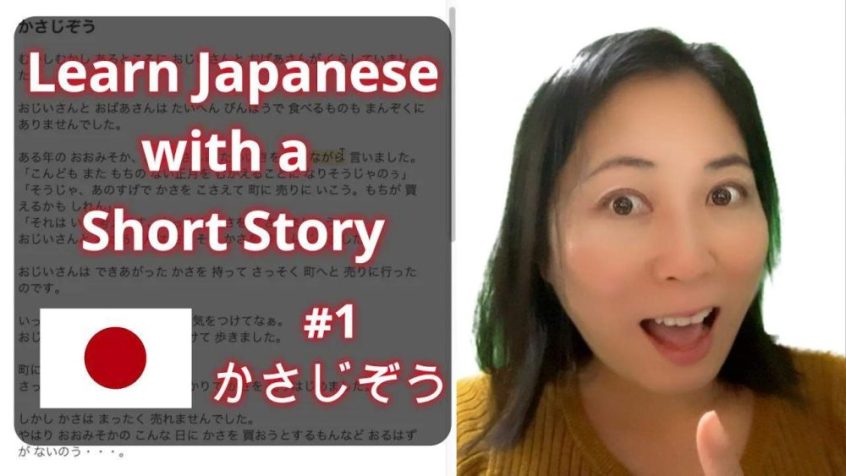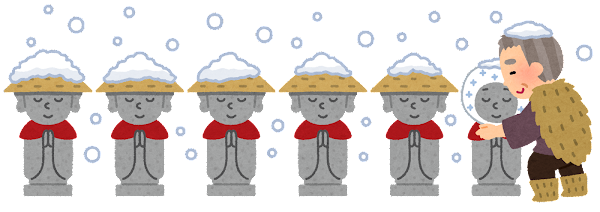Do you know any Japanese folktales? You might heard some of the famous ones like Momotaro and Kintaro.
I have started a new Japanese lesson section, Learn Japanese with short stories. I’m planning to make it a series, so please keep in touch with us!
Today’s short story is one of Japanese folktales, Kasa Jizō. This is another famous folktale that everyone should have read in picture books as a child.
You may think that old Japanese words are used in these tales. However, the explanations in the video are contrasted with modern translations, so you can learn the phrases used in daily conversation. This article includes an explanatory video, an overview, the story text (in Japanese), and a vocabulary and phrase list. If you find anything inadequate, please let me know in the comments.
Let’s take a look now!
Explanatory Video
Story Outline かさじぞう
In a snowy country, there lived a very poor old couple. The end of the year was near, but they could not even buy rice cakes to welcome the New Year. So the old man went out to the town to try to sell the hats he had bought. Unfortunately, the kasa (woven hat) did not sell at all. As a blizzard was threatening, the old man gave up on selling the hats and headed home. In the snowstorm, Grandpa saw six Jizō statues and felt sorry for them seeing how cold they looked, so he decided to give away his unsold kasa. However, he was short of one hat, so he put his own hat on the last Jizō and returned home with nothing. When the old woman heard the reason from the grandfather, she said, “You did a good thing,” and did not blame him for not being able to buy anything in the end.
That night, while the old couple was sleeping, they heard a sound as if something heavy had fallen outside their house. So they opened the door and looked outside to find a pile of rice bales, vegetables, fish, and various other foodstuffs, as well as koban (former Japanese oval gold coin).
and other treasures piled up in front of the house. The elderly couple watched the six Jizō statues, wearing hats and hand towels, leave in the falling snow. Thanks to the gifts from the Jizō, the old couple was able to have a happy New Year.
Story (in Japanese)
かさじぞう
むかしむかし あるところに おじいさんと おばあさんが くらしていました。
おじいさんと おばあさんは たいへん びんぼうで 食べるものも まんぞくに ありませんでした。
ある年の おおみそか、おじいさんは ためいきを つきながら 言いました。
「こんども また もちの ない正月を むかえることに なりそうじゃのぅ」
「そうじゃ、あのすげで かさを こさえて 町に 売りに いこう。もちが 買えるかも しれん」
「それは いい 考えです。さっそく かさを こさえましょう」
おじいさんと おばあさんは さっそくかさを 作り はじめました。
おじいさんは できあがった かさを 持って さっそく 町へと 売りに行ったのです。
いってらっしゃい おじいさん。気をつけてなぁ。
おじいさんは 雪の 中を 町へむけて 歩きました。
町についた おじいさんは
さっそく みんかの のきさきを かりて かさを 売りはじめました。
しかし かさは まったく 売れませんでした。
やはり おおみそかの こんな 日に かさを 買おうとする者など いるはずが ないのう・・・。
もちも 買わずに 家にかえれば ばあさん、がっかりするじゃろうな・・・。
おじいさんは お店をたたみ とぼとぼと 家に 帰っていきました。
町を はずれ とちゅうの 野原までやって来ると、おじいさんは おじぞうさまを みつけました
「おぉ、おぉ、お気のどくに。こんなに雪に さらされて さぞ お寒いじゃろうに」
おじいさんは そう言うと、おじぞうさまの 体に つもった
雪を はらって あげるのでした。
「そうじゃ、 この かさを かぶせて さしあげましょう」
そう言うと おじいさんは、売れのこった かさを おじぞうさまに かぶせて あげたのでした。
ところが こまった ことに かさの数は 五つ、おじぞうさまは 六人。どうしても かさが 一つ たりません。
おじいさんは 考えたすえに 自分のしていた 手ぬぐいを さいごの おじぞうさんの頭に かぶせて あげたのでした。
「わしの きたない 手ぬぐいで もうしわけないが これで かんべんして 下さい」
そう言うと おじいさんは 雪の中を 家にむけて 歩きはじめるのでした。
「ただいま かえったよ」
「おかえりなさい、さむかったでしょう」
「かさは うれましたか?」
「いいや、一つも 売れなかったわい」
そして おじいさんは とちゅうで おじぞうさまに かさを かぶせた ことを おばあさんに 話しました。
おばあさんは いやなかお ひとつせずに 言いました。
「それは それは 良いことを しましたねぇ、おじいさん。
こんな 雪の中 おじぞうさまも きっと さむかったでしょうからねぇ」
そのあと おじいさんと おばあさんは つかれて 休んだのでした。
すると ま夜中、家の外から 「よいやさ、よいやさ」と
そりを 引く かけ声が きこえてきました。かけ声は だんだんと 家の方へ 近づいてきたのです。
そして 家の前で かけ声が とまると どっすーん、どっすーんと 大きな音がしたのです。
家は大きくゆれ、二人とも これには おどろいて とびおきました。
「なんの 音じゃろう?」 「じしん じゃろうか?」
二人は そうっと とびらを あけると
なんと、かさを かぶった おじぞうさまと てぬぐいを した おじぞうさまが、
そりに のせた たくさんの にもつを 家の のき先に 下ろしているのでした。
二人は かえって行く おじぞうさまに 手をあわせて おれいを言ったのです。
年も明け、二人は おじぞうさまに いただいた お米で もちつきをして近所の 子どもたちにも つきたての おもちを わけて 上げたのです。
おしまい
Vocabularies / Phrases
- 笠地蔵(かさじぞう)- title of this story. Jizō wearing woven hat
- 地蔵(じぞう): Jizō (the Kanji direct translation is womb of the earth) is made in the image of Jizō Bosatsu, the protector of the weak in the world (such as children and travelers), also known as the “child of the earth. Jizō Bodhisattva, also known as Earth Bearer, is made of stone, which is believed to have spiritual powers of protection. They can be found in Japan at temples, mountain roads, and roadsides.
-
くらしていました(暮らしていました)-> 暮らす/暮らします: to live
-
びんぼう(貧乏): poor = お金がない. 貧乏な(びんぼうな na-adj.)=貧しい(まずしい i-adj.)
-
まんぞく(満足): satisfactory, content (na-adjective)
e.g. 満足な結果 (まんぞくなけっか) satisfactory result - おおみそか(大晦日): December 31.
- ためいき(ため息): ため息をつく(verb)
- しょうがつ(正月): New Year
- すげ: sedge
- こさえて = つくって
- みんか(民家): private house
- のきさき(軒先): eaves
- がっかりする:disappointed
- 雪が積もる(ゆきがつもる): snow piled up, snow lies on the ground
- かぶせる(被せる): to cover
- たりる(足りる): suffice, enough
- 手ぬぐい: Japanese thin cloth towel
- 勘弁(かんべん)してください: Please forgive me
- 嫌な顔一つせずに(いやなかお ひとつせずに): without a single look of disapproval
- かけごえ(掛け声): a yell (call, shout) of encouragement
- そり: sled, sledge そりを引く(ひく): Pull a sled
- お礼(おれい): gratitude, thanks
- 手を合わせる(てをあわせる): put hands together
ものがたりはどうでしたか?
How was the story? Hope you enjoyed it!


